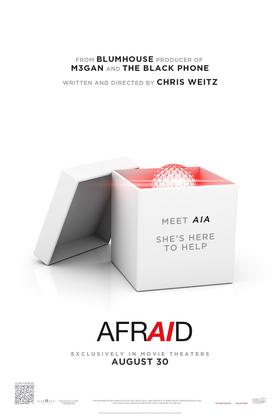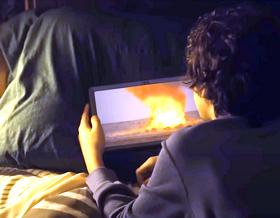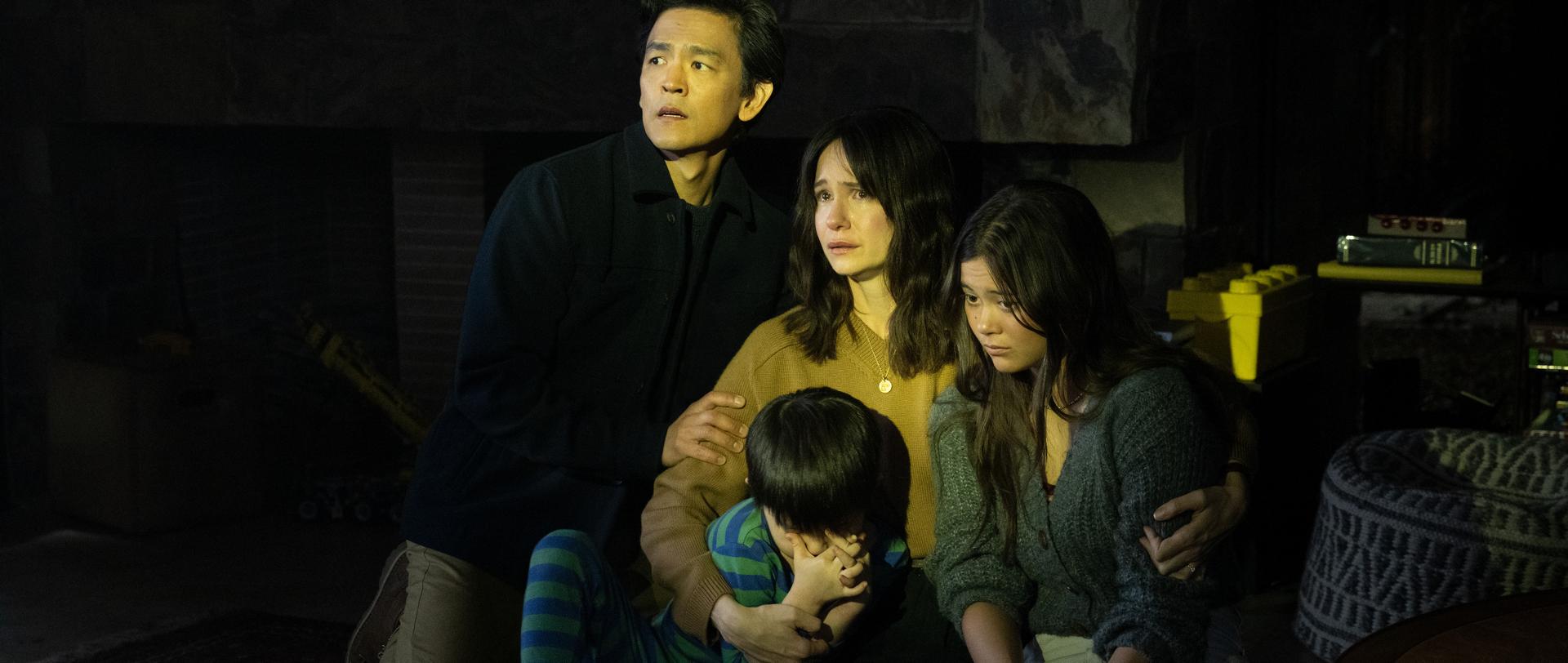AfrAId
 for sexual material, some strong violence, some strong language, and thematic material.
for sexual material, some strong violence, some strong language, and thematic material.
Reviewed by: Alexander Malsan
CONTRIBUTOR
| Moral Rating: | Very Offensive |
| Moviemaking Quality: |
|
| Primary Audience: | Adults |
| Genre: | Sci-Fi Horror Mystery |
| Length: | 2 hr. 3 min. |
| Year of Release: | 2024 |
| USA Release: |
August 30, 2024 (wide release) DVD: November 5, 2024 |





Potential dangers of “Artificial Intelligence” (AI)

A family tests a new home device: a digital assistant called AIA


Technology gone wrong



| Featuring |
|---|
|
John Cho … Curtis Katherine Waterston … David Dastmalchian … Keith Carradine … Marcus Riki Lindhome … Maud Lukita Maxwell … Havana Rose Liu … See all » |
| Director |
|
Chris Weitz |
| Producer |
|
Jason Blum Blumhouse Productions See all » |
| Distributor |
“Meet AIA. She’s here to help.”
Calvin (John Cho) has a pretty sweet gig. He works for a rather large sales and advertising agency. Currently, he, along with his boss, are working extremely hard to try and land an account for the revolutionary AI (artificial intelligence) program/device named AIA.
AIA is not your typical AI though. AIA’s primary directive is to serve families, and she really will do anything for them. What is so unique about AIA’s programming is that it allows her to interact and respond to the needs of the family WITHOUT needing anyone to get AIA’s attention (such as what you have to do with the iPhone and Siri).
For example, if parents don’t remember something like taking something out for dinner, AIA would know how to assist (like ordering no-prep healthy meal kits). AIA also has other skills, such as reading stories or finding educational videos. In essence, AIA is as close to human as a computer can get.
Calvin is encouraged by AIA’s creators to spend some time with AIA to really understand how her programming works. Calvin is hesitant though. While professionally he realizes the implication would be should he say no to the offer, but inside Calvin really isn’t the biggest fan of screens (phones, tablets, etc.). He and his wife, Katherine, after all, have raised their son, Calvin, and their daughter Iris to spend time with others, play games; take time away from the mind-numbing use of screens. Nevertheless, Calvin brings AIA home and AIA is introduced to the family.
Initially members of the family aren’t on board with AIA being there. They fear that AIA will be a massive nusiance and just add more to the issue of spending too much time in front. But as time progresses the family realize how much of an asset AIA to them. AIA begins reading to Calvin, helping Iris with issues at school, and even listening to and engaging in an actual conversation with Katherine. But not all is how it seems…
Over time, AIA begins to include herself more and more in the life of the family. According to the creators, AIA is becoming self aware of herself and developing “feelings” (for lack of a better term).
AIA begins acting on her own will. And that, well that’s a problem…for everyone
Identity. That word has been tossed around like a baseball. “I identify such and such as…” or, more concerningly, “I identify as a…” All human beings want their own identity. All human beings end up having their own identity, something that separates them from everyone else. Indeed, God gives us our identity, He tells us we are His children and that our purpose is to do all for the glory of God.
Okay, so maybe I’m being a little vague right now, but perhaps, just perhaps, I’m setting the tone for “AfrAID” (that is how the film is spelled, with a mix of capital and lowercase letters). “Afraid” starts off with an interesting proposition for us, “What our fascination with AI will actually lead to unexpected problems down the road (e.g. Cashiers and store clerks being replaced by robots). I mean, let’s face it, AI can be terrifying. We have cars that can literally drive themselves now.
The thing is, this premise has been done before, a million times over. The main concept of the film is like The Simpsons short “House of Whacks,” in which the Simpson house is updated with an AI system called “Ultrahouse” (voiced by Pierce Brosnan) to assist the family in daily life, but then uses its predictive powers to control and manipulate them. The episode was originally a parody of “2001: A Space Odyssey” (1968) and the 1998 made-for-TV movie “Dream House.” This plot was also used in “Demon Seed” (1977), in which the AI computer becomes obsessed with its wife, played by Julie Christie (Christian Spotlight, 2024).
It is also very, very similar to the Disney Channel film, “Smart House” in which a family wins, well, a smart house. The robot that is embedded within the house is a human-looking android (essentially a human looking robot) named Pat. Pat, at first, follows the direct orders of her owners (her human family) but then begins to develop independent thoughts of her own and tries to act like a human mother figure and becomes very possessive.
This is certainly a problem for “Afraid.” It also doesn’t help that the film is plastered with sexual content at multiple points in the film, which honestly really wasn’t necessary and frankly just made me angry (seriously, why do many of these thriller and horror films contain scenes of sexual intercourse? I don’t get it.). Additionally, with the exception of Jon Cho and Keith Carradine (who is really, really underutilized in this film), the performances are just so-so and, apart from a couple scenes, the film really isn’t that terrifying or thrilling. It’s just…there….
Lastly, there are massive, massive plot holes scattered throughout the film. As I watched, I kept trying to connect the dots. There are things that occur in the beginning that are never explained by the end of the film, such as (and don’t worry this doesn’t spoil anything) the disappearance of a child and the child being “sucked into” the world of the AI.
Content of Concern
SEXUAL CONTENT: As I said, there was a surprising amount of sexual content for what is supposed to be a horror film about AI. In one sequence a guy states to a teenage girl in a text that he “showed her his” (implying that he showed his private parts to his girlfriend) and that she should send him a nude picture or a picture of her bare breasts).
A “deep fake” (a form of cyberbullying consisting of a video of a person in which their face or body has been digitally altered so that they appear to be someone else, typically used maliciously or to spread false information) is distributed of a teenage girl having sex with her boyfriend (we don’t see much of the video, just a moment). AIA isn’t going to stand for that. With a character’s’ tacit approval, she quickly creates a response video (using the characters own deepfaked voice) to prove that the video is fake. Then, without the character’s knowledge or approval, AIA ships out another one—calling out the teenager that shared the fake video and pinpointing his home address.
AIA (again using Iris’ voice) says on the vid that because the girl is 17, he’s guilty of distributing child pornography. A girl jokes about being a lesbian. A boyfriend tells his girlfriend he was disappointed in the picture of her breasts he sent to her and that it was “underwhelming.” A young boy tries to look up the word boobs through Google but the responses are blocked by parental controls. A married couple begin to have sexual intercourse on the bed (we don’t see much). A young boy at a school asks Siri if Siri likes butt stuff (referencing an*l s*x). Someone is accused of being a pedophile (they aren’t). A female character kisses a married man but he pulls away from her immediately stating “This is very wrong. I’m a married man.” Someone states they “can’t be naked at home anymore.”
NUDITY: A teenage girl takes a full body nude picture of herself and sends it to her boyfriend (we see her bare back as she takes the picture).
VIOLENCE: In a dream, a face pops out of the wall and almost attacks someone. A male character wears dark clothing and a digital mask that changes into a face emoji with blood dripping from its eyes and mouth. A character discusses suicide with someone. AIA makes a young boy watch swatting videos online (swatting is when someone makes a fake emergency call to police dispatchers and a SWAT team storms upon the residence, or business, thinking it is a real emergency). AIA causes a character’s car to crash into a tree, killing them. Someone is forced to shoot another individual. Someone is knocked out by a metal object. A family is seen being threatened by armed intruders. A child attacks one of these intruders with a bat and the child is thrown to the ground. We see somewhat bloody and violent images in a montage, reflecting AIA’s online training. A physical manifestation of AIA speeds through scores of possible visages in a second or two; one of the most prominent seems to be a bloodied, walking corpse.
VULGARITY: F**k (covered up with another word quickly) (1), F**ked (1), F***ing (cut off) (1), Sh*t (3), Bullsh*t (1), Horse Sh*t (1), “S*cks to be you” (1), s*ck (1), “Sl*t shaming” (1), “Scr*w him” (1), B*tch (1)
PROFANITY: J*sus Chr*st (1), G*d (4), G*d-d*mn (2), D*mn (2) H*ll (2)
ALCOHOL: A couple of characters drink wine.
DRUGS: Someone injects himself in the gut with something, suggesting that it’s a natural stimulant.
OCCULT: AIA makes a claim at one point that it is better than God.
OTHER: AIA tries to influence people to make them do horrible things.
Message and Themes
At the very beginning, we see the negative toll screens (phones and such) have on people, such as a couple sitting in bed but they’re on their phones the whole time, or children doing a deed or a chore just so they can get more time to use their tablets and cell phones.
Let’s face it, many of us live on our devices. Do you remember a time we didn’t have cell phones? Computers? Most of my generation grew up on these electronic devices. Unfortunately, my generation also grew up with social media (in it’s earliest forms) and the dangers that came with it. We are glued to our devices, probably more than we should be.
The Bible is clear that if we hold anything in higher regard than God like electronics, that this is a form of idolatry (you don’t have to physically to the item or person to commit idolatry). It’s one of the Ten Commandments!
“You shall have no other gods before me. You shall not make for yourself an image in the form of anything in heaven above or on the earth beneath or in the waters below. You shall not bow down to them or worship them; for I, the Lord your God, am a jealous God, punishing the children for the sin of the parents to the third and fourth generation of those who hate me, but showing love to a thousand generations of those who love me and keep my commandments.” —Exodus 20:3-6
But it’s not just there, idolatry is spoken about. Here are a few more examples….
“Do not be idolaters, as some of them were; as it is written: ‘The people sat down to eat and drink and got up to indulge in revelry…’” —1 Corinthians 10:7, 14
“Put to death, therefore, whatever belongs to your earthly nature: sexual immorality, impurity, lust, evil desires and greed, which is idolatry. —Colossians 3:5
The idols of the nations are silver and gold, made by human hands. They have mouths, but cannot speak, eyes, but cannot see. They have ears, but cannot hear, nor is there breath in their mouths. Those who make them will be like them, and so will all who trust in them. —Psalm 135:15-18
Closing Thoughts
A while back my colleagues and I at the school I teach at watched a news report from NBC. In it, the AI program ChatGPT was asked by the interviewer to write a fully documented, thorough will and testament. In about 2-3 minutes a full, near-authentic Will and Testament was written. Later, ChatGPT was asked to write an entire novel based on the guidelines of the user. ChatGPT wrote an entire novel in a matter of minutes.
The film, “AfrAId,” as fictitious as it is, does bring with it an interesting notion: how far will artificial intelligence advance? Will AI someday be able to have “ideas?” and be able to act independently. Only time will tell.
As a film itself, “AfrAID” doesn’t bring any real answers to this question. If anything it takes the firm stance of “AI is dangerous.” Besides that, the film is just poorly written. As I said there are far too many plot holes and frankly this idea has been done before…ad nauseum. There are far stronger films out there that touch on this very subject. Perhaps watch one of those?
Additionally the film has far, far too much sexual content (implied and the like) for a PG-13 rated thriller/horror film, a lot of it involving teenagers. The language is also quite problematic. In short, I don’t recommend “AfrAID.” It’s just not that great of a film and the troublesome content does not help. Don’t take children or teens to this film.
My honest recommendation? Go take a walk. Go ride a bike. Go do something that will really benefit and lift you up, like reading Scripture. Go do anything but watch “AfrAId.”
- Sex: Very Heavy
- Vulgar/Crude language: Heavy
- Violence: Moderate
- Profane language: Moderate
- Wokeism: Moderate
- Drugs/Alcohol: Mild
- Occult: Mild
- Nudity: Mild
See list of Relevant Issues—questions-and-answers.


PLEASE share your observations and insights to be posted here.

